
4 min read
Each year a team of researchers travels the globe and attempts to determine the overall happiness of people in various countries. The results are published in the annual World Happiness Report.
Here are some of my favorite insights from this year’s report.
What Drives Happiness?
Researchers have found that roughly 75% of human happiness is driven by six factors: strong economic growth, healthy life expectancy, quality social relationships, generosity, trust, and freedom to live the life that’s right for you.
To determine how well the citizens of each country were doing in these six areas, researchers collected data from thousands of surveys filled out by residents in each country. In total, data was collected for 155 different countries around the world.
Each country received an overall happiness score based on the survey responses across these six factors. Here are the results…
The Numbers
Here are the 30 happiest countries from the report, along with their happiness scores:
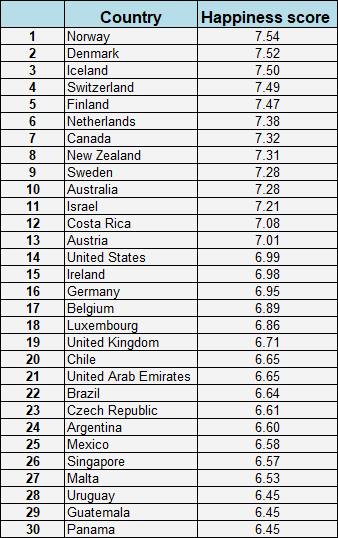
Norway ranked highest among all the countries in the report, with an overall happiness score of 7.54, followed closely behind by Denmark with a score of 7.52.
In general, the Norwegian countries dominated this report. Norway, Denmark, Iceland, Finland, Netherlands, and Sweden all cracked the top 10 in overall happiness.
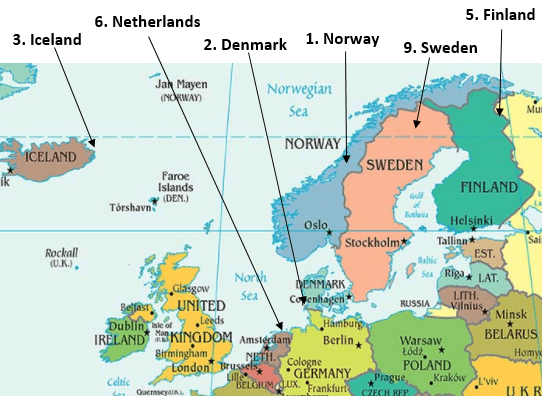
Not every country on the report had citizens who were as happy as the Norwegians, though. At the bottom of the list was the Central African Republic, with a happiness score of 2.69.
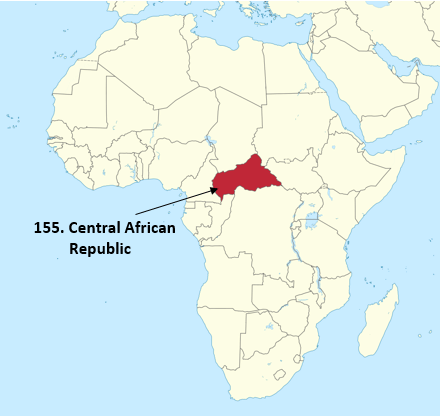
The U.S. has also been dropping in happiness each year since this report first came out a few years ago. This year it landed in the 15th spot, slightly behind the leading Latin American country of Costa Rica at number 13.
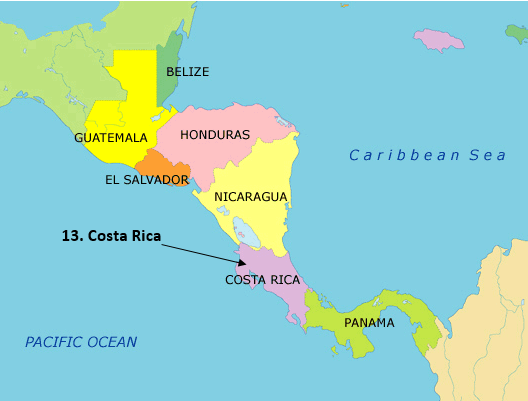
Singapore, home to my second largest group of readers on this blog, came in at number 27, with an overall happiness score of 6.57.
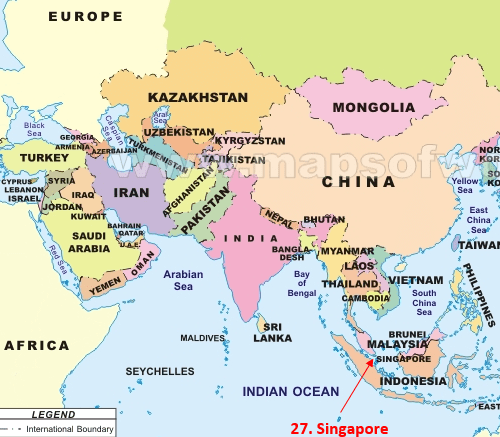
Here’s a look at the happiness scores of every country in the report:
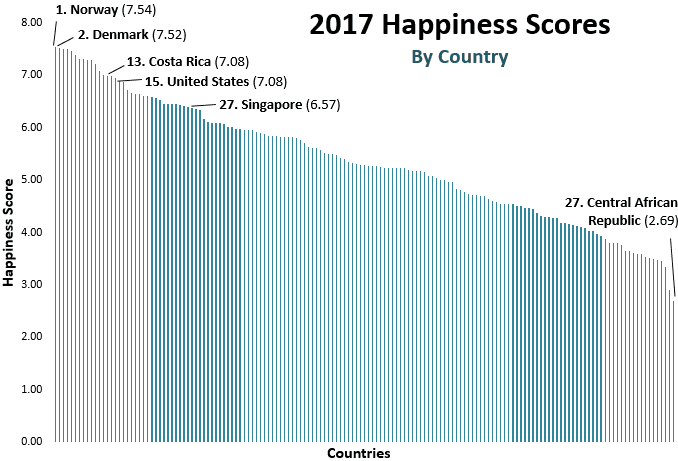
Happiness & Finance
When I read the report, there was one factor I was particularly curious about: how much did wealth impact happiness?
Researchers used GDP per capita to measure the overall wealth of each country. In general, the higher the GDP per capita, the wealthier the country. Each country received a score between 0 and 2 to indicate how much GDP Per Capita impacted the overall happiness of it’s citizens.
To see how GDP per capita and happiness scores compared, I downloaded the raw data and made a scatter plot. Each tiny dot represents a country:
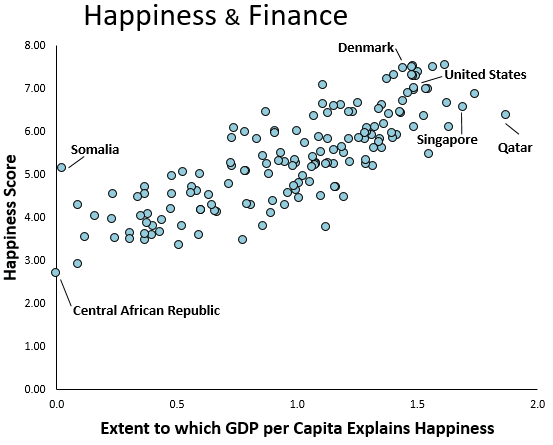
In general, citizens in wealthier countries are happier. No surprise there.
But what’s interesting to see is that two countries can have the same GDP per capita, yet vastly different happiness scores.
For example, GDP per capita contributes to the happiness of citizens to the same extent in Botswana as it does in Costa Rica, yet Costa Ricans are nearly twice as happy.
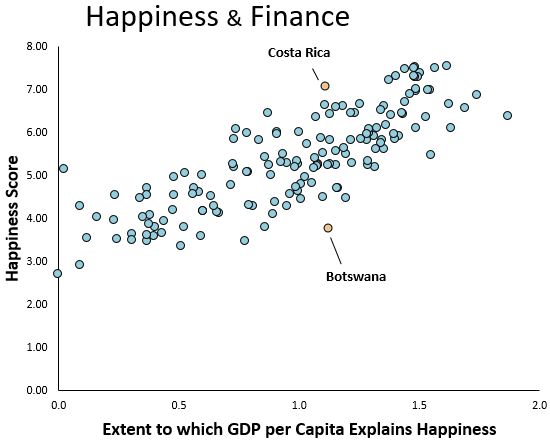
This indicates that wealth by itself can’t explain overall happiness.
It turns out the biggest difference between the happiness of citizens in Botswana compared to those in Costa Rica can be explained by one of the other six factors that contribute to happiness: life expectancy.
Happiness & Life Expectancy
A plot between happiness and life expectancy reveals a similar pattern: higher life expectancy is correlated with higher happiness levels.
Note: Each country received a score between 0 and 1 to explain the extent to which life expectancy contributed to happiness.
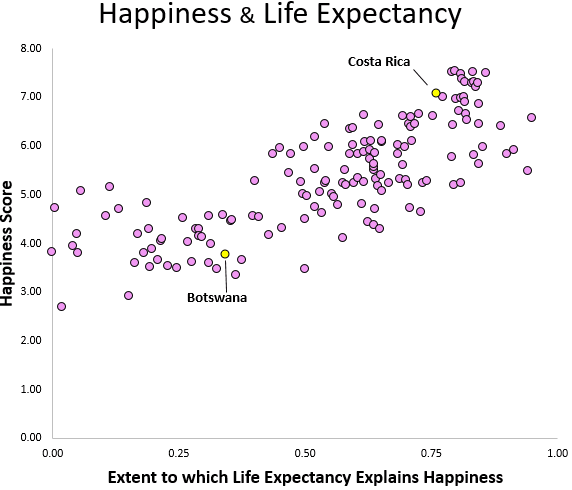
This plot reveals the massive underlying difference between the happiness levels of citizens in Bostwana compared to those in Costa Rica.
A quick google search for life expectancy in these two countries confirms this finding:


On average, Costa Ricans live 24 years longer than Botswanans. That’s a staggering difference. It’s no wonder why the citizens of Botswana aren’t nearly as happy as those in Costa Rica.
Money isn’t so important when you don’t have the means to live a long and healthy life.
Keep Exploring
If you’re interested in reading the report yourself, you can download the entire PDF here. There’s plenty of insightful findings in the report; I simply shared some of my favorites here.
If you want to see the exact Excel file I used to crunch some of this data and create the charts in this post, you can download it here.
Thanks for reading 🙂
- The Ad Revenue Grid - August 6, 2021
- Attract Money by Creating Value for a Specific Audience - July 13, 2021
- The 5-Hour Workday - March 26, 2021
Full Disclosure: Nothing on this site should ever be considered to be advice, research or an invitation to buy or sell any securities, please see my Terms & Conditions page for a full disclaimer.

Funny that Singapore is among your largest reader base. I’ve been there twice and loved it. They have created an incredible country for themselves – an awesome metro system, clean, safe, amazing shopping centers, and from what I understand, a modest rate of taxation. I’m definitely going back to visit and just wish I could retire there. Singaporeans, please trade places with me (I’m in US) 🙂
I’m a Singaporean, and I’m surprised that we make up one of the largest reader base for this blog too! Our country is in the midst of upgrading our public transport system to support a car-lite society (because we are such a small country), but our public transport system is also facing hiccups every now and then. Although our financial markets are currently not as developed as in the US, I love that there are no dividend tax or capital gain tax levied on Singaporean investors.
I wasn’t aware that there are no dividend tax or capital gains tax for Singaporean investors?? That’s a pretty incredible benefit.
Yes! To top it off, we can hold all our shares (only limited to those purchased on the Singapore Exchange) in the Central Depository (CDP) instead of paying brokers custodian fees to hold our shares. I believe that this is also a feature that is exclusive to Singapore.
It’s probably the number one place on my travel list right now – I’ve only heard positive things about the country! I’d love to visit within the next few years 🙂
Do update on your blog or social media when you intend to visit Singapore! Maybe we can meet up over coffee 🙂
I absolutely will! I’d love to meet up for coffee.
Good to see US is in the top 15. Nordic countries seem to be always the happiest. I always think that the happiness of the society is more important then the sum total of the happiness of it’s individuals (The whole is greater than the sum of its parts). Here is to a much happier year for every human being.
You’re right – the Nords consistently dominate the top 10 each year. I think you’re also right about the societal happiness factor. It seems those countries have figured out how to manage healthcare, taxes, and education in a way that provides the greatest benefit to the greatest number of people.